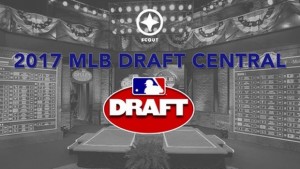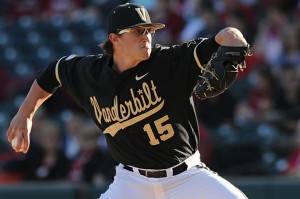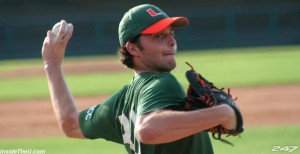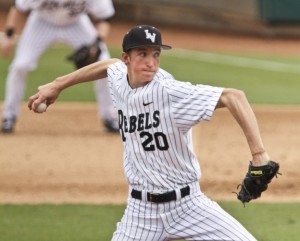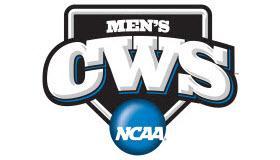Mock Drafts
Every year I say i’ll stay away from the Mock Draft links … and every year I come back. Here’s a running collection; i’ve listed their top-5 and then who they project the Nats to take at #25 (if they project out that far). Honestly, projecting even the top 5 has been folly in year’s past; last minute changes occur all the time and drastically change the top of every draft. Look no further than the 2011 draft that netted the Nats presumed top pick Anthony Rendon.
I’ll continue to add in mocks as they get published post-posting up until the draft.
However this year you’ll notice that the same general collection of names are listed in nearly every top 5 collection. Here’s a quick summary of those top-5 guys.
Collegiate top-5 names:
- Brendan McCay: 1b/lhp Louisville. All-American as a Soph. 2016 Collegiate National team. Good two-way player likely being drafted as a pitcher.
- Kyle Wright rhp Vanderbilt. 2016 Collegiate National team. Solid #1 starter for Vanderbilt, a machine for developing top-end pitching draft picks (see Jordan Sheffield, Walker Buehler, Carson Fuller, Tyler Beede, Sonny Grey, Mike Minor and David Price, all of whom were 1st round starting pitcher picks from Vanderbilt over the last 10 years)
- Alex Faedo: rhp Florida. 2016 Collegiate National team; #1 starter from Florida, less known for developing pitchers but who did have two 1st round arms drafted just last year (A.J. Puk, Dane Dunning).
- Jeren Kendall OF Vanderbilt. 2016 Collegiate National team; was presumptive 1-1 before really struggling at the plate in 2017, opening the door for one of the above college arms likely going 1-1.
- J.B. Bukauskas rhp UNC via Ashburn, VA. 2016 Collegiate National team, fantastic numbers leading UNC to its first national seed in a while. Considered undersized (he’s 6’0″) but has a big arm; widely projected at #6 to Oakland but does get some top-5 press.
- Tristan Beck rhp Stanford who did not play in 2017 due to injury but was a pre-season all-american; some thought he may get picked as an injury stash like we’re seeing more and more.
- Adam Haseley, 1B/rhp from UVA who has massively improved his draft stock this year. He went from being just a good player to being mentioned in the top 5 in some mocks. I don’t think he goes top-5, but he’s gone before the top-10 is done.
Prep top-5 names:
- Hunter Greene: ss/rhp Notre Dame High, CA (UCLA commit). 2015 18U team as a Jr., Standout at PG Nationals 2016. Two-way talent, 95-97 on the mound but also a fantastic hitter. 18U National team trials. Area code star. Likely getting drafted as an arm, might be the first prep RH starter to go 1-1. Stopped pitching mid-way through the spring though, presumably to save his arm for his first pro season.
- Royce Lewis ss/2b San Juan Capistrano, CA (UC Irvine). flashed power at Under Armour Game. Helium guy, likely a top-5 pick.
- MacKenzie Gore lhp Whiteville (North Carolina) High School (ECU commit). Also a helium guy, has has his stock rise highly this spring.
- Jordon Adell of/rhp Ballard High, KY (Louisville). 18U National team trials. Area Code star; falling status early 17 badly but still gets some top-5 love.
- Shane Baz, rhp from Concordia HS, TX (TCU): fast mover, mid-90s big righty in the same prep construction from the Houston area as the likes of Josh Beckett, Jamison Taillon and Tyler Kolek. I don’t think he’s a top-5 pick but should be top-10.
Here’s the Mock draft collection that i’ve saved over the past months. If you know of one I’m missing, let me know and I’ll add it in.
- MLBPipeline (Jim Callis) 2017 Mock Draft v1.0 12/14/16: Faedo, Kendall, Greene, Wright, Lewis (only projected top 10 picks)
- MLBPipeline (Jim Callis) 2017 Mock Draft v2.0 5/12/17: McKay, Greene, Gore, Lewis, Wright. Nats taking Alex Lange, a polished, quick moving RH starter from LSU who I’d love to get.
- MLBPipeline (Jim Callis) 2017 Mock Draft v3.0 5/26/17: Wright, Greene, Gore, McKay, Haseley. Nats still on Lange.
- MLBPipeline (Jim Callis) 2017 Mock Draft v4.0 6/9/17: Wright, Greene, Gore, McKay, Lewis. Nats on Clarke Schmidt, a good RH starter from South Carolina who had to have TJ surgery (sound familiar?). However, in his mock this leaves Houck, Pearson and Carlson on the board, and I think the Nats would take any of those three ahead of TJ guy.
- MLBPipeline (Jim Callis) 2017 Mock Draft v5.0 6/12/17: McKay, Greene, Gore, Lewis, Hiura. Wow. Nats taking Seth Romero, a LH starter who was just kicked off of UHouston’s team, his 3rd “strike” with the team. Sounds like a winner to me and I hope the Nats are not foolish enough to take a 3-time suspended college player. Problem is, he’s a Scott Boras client, and people are worried that Boras is talking to the ownership again…
- MLBPipeline (Jonathan Mayo) 2017 Mock Draft v1.0 12/14/16: Greene, Kendall, Faedo, Lewis, Wright (only projected top 10 picks).
- MLBPipeline (Jonathan Mayo) 2017 Mock Draft v2.0 5/31/17: Wright, Greene, Lewis, McKay, Gore. Nats getting Lange (the MLB.com guys seem confident on Lange dropping to #25).
- MLBPipeline (Jonathan Mayo) 2017 Mock Draft v3.0 6/12/17: McKay, Greene, Gore, Lewis, Hiura. Nats on Lange.
- ESPN (Keith Law) 2017 Mock Draft v1.0 dated 5/11/17: McKay, Greene, Lewis, Wright, Gore. Nats taking Tanner Houck, a polished, quick moving Missouri RH starter.
- ESPN (Keith Law) 2017 Mock Draft v2.0 dated 5/30/17: Wright, Greene, Gore, McKay, Lewis. Nats on Romero.
- ESPN (Keith Law) 2017 Mock Draft v3.0 dated 6/11/17: McKay, Greene, Gore, Lewis, Wright. Nats taking Romero, again. Great.
- Fangraphs (Eric Longenhagen) 2017 Mock Draft v1.0 dated 6/5/17: Wright, Greene, Gore, McKay, Lewis. Nats taking Tristan Beck, the injured Stanford RHP. Considering that Beck was once rumored to be possible top-5, if he falls to 25 I think the Nats would jump.
- D1Baseball (Frankie Piliere) 2017 Mock Draft v1.0 dated 5/18/17: Wright, McKay, Greene, Lewis, Gore. Nats taking Tanner Houck.
- D1Baseball (Frankie Piliere) 2017 Mock Draft v2.0 dated 6/9/17: Wright, Greene, Lewis, McKay, Gore. Nats taking Romero. Problem with this mock: the next 3 after Romero are Carlson, Peterson and Lange, and I’d have to think the Nats would take any of those three over Romero.
- Baseball America (John Manuel) 2017 Mock Draft v1.0 dated 3/16/17: Greene, McKay, Lewis, Bukauskas, Beck (only projecting 1st 10 picks: no Nats pick).
- Baseball America (John Manuel) 2017 Mock Draft v2.0 dated 4/20/17: McKay, Greene, Lewis, Wright, Beck. Nats taking Brady McConnell, a prep SS from Florida who i’ve never heard of and have a hard time believing we’d actually take.
- Baseball America (John Manuel) 2017 Mock Draft v3.0 dated 5/18/17: Wright, McKay, Greene, Lewis, Baz. Nats taking Romero.
- Baseball America (John Manuel) 2017 Mock Draft v3.5 dated 5/30/17: Wright, McKay, Greene, Lewis, Gore. Nats on Schmidt.
- HeroSports.com (Chris Crawford) 2017 Mock Draft v4.0 dated 5/12/17: McKay, Greene, Wright, Bukauskas, Beck. Nats taking Jordon Adell, a prep OF from Kentucky who entered the year projected near the top of the draft but whose stock has fallen precipitously. I could see the Nats having him ranked high and (much like what happened with Lucas Giolito) them taking the chance if Adell is still available after being a top-5 rumored guy entering the 2017 season.
- MinorleagueBall.com (John Sickels) 2017 Mock Draft v1.0 dated 5/18/17: McKay, Wright, Greene, Gore, Beck. Nats taking Keston Hiura, an OF from UC-Irvine that i’ve never heard of.
- PerfectGame.org (Brian Sakowski) 2017 Mock Draft v1.0 dated 5/10/17: Greene, Wright, Lewis, McKay, Beck. Nats taking Hans Crouse, a prep RH starter from California. Crouse is good, but I can’t see the team taking a prep 1st rounder if the likes of Houck and Lange are on the board.
- PerfectGame.org (Brian Sakowski) 2017 Mock Draft v2.0 dated 6/2/17: McKay, Greene, Lewis, Wright, Gore. Nats taking Houck.
- PerfectGame.org (Brian Sakowski) 2017 Mock Draft v3.0 dated 6/12/17: McKay, Greene, Gore, Lewis, Wright. Nats taking Romero. But leave the likes of Carlson, Schmidt, Houck, Lange, Canning and Little on the board?? No way.
- SI.com (Jay Jaffe) Mock Draft v1.0 dated 5/16/17: McKay, Greene, Lewis, Wright, Gore. (Only projected top 10 picks).
- SI.com (Jay Jaffe) Mock Draft v2.0 dated 6/12/17: Wright, Greene, Gore, McKay, Lewis. Nats again on Romero. This mock leaves Pearson, Houck, and Carlson on the board, which I have a hard time believing would happen (that the Nats would take head case Romero over any of those three).
- Seedlings to the Stars/Calltothepen.com (Benjamin Chase) Mock Draft v1.1 dated 5/3/17: Greene, McKay, Lewis, Wright, Gore. Nats on Wil Crowe, a RH starter from South Carolina.
- Seedlings to the Stars/Calltothepen.com (Benjamin Chase) Mock Draft v2.1 dated 5/10/17: McKay, Adell, Greene, Wright, Gore. Nats on Matt Sauer, a prep RH starter from California.
- Seedlings to the Stars/Calltothepen.com (Benjamin Chase) Mock Draft v3.1 dated 5/18/17: Wright, McKay, Greene, Beck, Adell. Nats taking Brendon Little, a JuCo LH starter by way of UNC who has impressed mightily this year.
- Seedlings to the Stars/Calltothepen.com (Benjamin Chase) Mock Draft v4.1 dated 5/25/17: Greene, McKay, Gore, Wright, Lewis. Nats taking Schmidt the TJ guy.
- Seedlings to the Stars/Calltothepen.com (Benjamin Chase) Mock Draft v5.2 dated 6/1/17: Wright, Greene, Gore, Beck, Pratto. Nats taking Houck.
- Seedlings to the Stars/Calltothepen.com (Benjamin Chase) Mock Draft v6.1 dated 6/7/17: Wright, McKay, Greene, Lewis, Gore. Nats on David Peterson, Oregon State’s #2 starter, a big body LHP who could be a faster mover and fill the void of SP prospects in our system.
- Seedlings to the Stars/Calltothepen.com (Benjamin Chase) Mock Draft Final dated 6/12/17: Greene, Wright, Gore, Lewis, Adell. Nats on Griffith Canning, UCLA’s friday starter who projects as a slight framed #3 starter. I saw him in the CWS regionals and wasn’t terribly impressed. Chase’s final mock is kind of out there; he’s the only guy who has Greene 1-1 and he has a ton of guys normally being projected to the Nats very early.
- TheBigLead.com (Ryan Phillips) Mock Draft v1.0 6/7/17: Wright, McKay, Greene, Lewis, Gore. Nats taking Sam Carlson, a prep RHP from Minnesota who is highly ranked on every board that I see, but has some risk being a skinny RHP from a cold-weather state whose entire profile is based on his showcase results. I’d guess the Nats would prefer a college arm.
- TheBigLead.com (Ryan Phillips) Mock Draft v2.0 6/12/17: McKay, Greene, Gore, Lewis, Wright. Nats on Houck (leaving Carlson, Pearson and Schmidt on the board).
- CBSsports (Mike Axisa) Mock Draft v1.0 6/8/17: Wright, Greene, Lewis, McKay, Gore. Nats taking Romero but with curious logic.
Todd Boss’ Mock draft top-5 prediction?
I think the risk-averse Twins will go with a solid college arm at #1, picking Wright. This lets the rebuilding Reds at #2 take the guy who is probably the best player in the draft in Greene, who might just be the next Dwight Gooden. At #3 San Diego can afford to take a prep kid since they too are rebuilding, taking Lewis. At #4, Tampa takes the solid, fast moving McKay and internally debates whether to put him on the mound or in the field. At #5, Atlanta can’t help themselves (they love taking local guys) and takes the North Carolina prep product Gore, who might be the 2nd best player in this draft. Oakland passes on Bukauskas thanks to his two late season iffy outings and goes with the next best collegiate arm on their board.
My top 5: Wright, Greene, Lewis, McKay, Gore.
ACTUAL DRAFT Results (added after the draft): Lewis, Greene, Gore, McKay, Wright. Reportedly McKay wouldn’t take an under-slot deal at 1-1, so Minnesota popped Lewis instead, allowing McKay to go 4th to Tampa where he still probably sets a bonus record. Lewis going 1-1 shakes up the order of the top 5, but not the top 5 themselves.
Who are the Nats going to take at #25:
I like the projections for a solid college arm, so if Houck or Lange is there, look for that as the pick. I could be talked into Schmidt as another TJ reclamation project. If a highly regarded prep falls (Adell, Hall, Crouse, and especially Carlson) look for that as a longer-term play pick. Notice not one projector puts them on a bat, so the talk of MSU’s Brent Rooker seems unlikely here. I think they’re set on a polished college arm to quickly move up and start to fill holes that will soon be left when the likes of Tanner Roark and Gio Gonzalez hit free agency.
Actual Nats #25 Pick (added after the draft): Seth Romero, LHP from Houston. Most of the pundits above called it correctly; the Nats take Romero.
